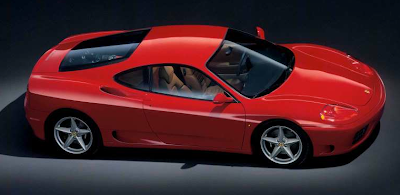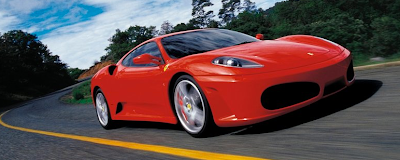We're accustomed to paying a little bit more for consumer goods than we did five years ago. We've all heard the stories from our parents who bought a Coke for ten cents when they were kids and then bought their first house for $25,000. For the gainfully employed, the annual differences - not the comparisons with 1970 - are annoying but generally manageable.
Then again, the teenager who loved the Ferrari F355 in 1998 and thought he could get a good tech job and save like mad and buy a new Ferrari in 2012 was terribly, outrageously, embarrassingly wrong. He's $58,000 shy of the total he needs. And yes, he had compensated for inflation.
The Ferrari F355 was priced at $121,495 in 1998. Who knows what Ferrari clients actually paid once they optioned their cars, but that's the USD price as Cars.com quotes it. Expecting the price of the F355's great-grandson to simply be $121,495 plus inflation proves to be silly. Inflation only takes the total up to $171,717. In fact, the 458 Italia costs $229,825, an 89.2% jump from the F355's price; a 33.8% jump above inflation.
Objectively, the 458 Italia is a far more impressive car. But we expect improvements from every new car introduction, so the 458's ability to accelerate faster than the F355, its ability to outcorner the 360 Modena, and its ability to outpretty the F430 aren't representative of something Ford hasn't also been able to achieve with the Mustang.
Speaking of which, Mustang GT prices have risen just 47.4% from 1998 to 2012. Adjusted for inflation, the 1998 Mustang GT's price would be $28,479 in 2012 dollars, just under the $29,710 Ford actually charges. And the 1998 Mustang GT sucked. It sucked so bad.
Adjusted for inflation, the 1998 Mazda MX-5 Miata would cost $27,030 in 2012 dollars. The MY2012 MX-5 Miata only costs $23,470, just a 22.7% jump from the MY1997's actual price. The 2005 Miata would cost $26,067 in 2012 dollars, a veritable rip-off compared to the current car.
From the 1998 F355 to the 2000 360 Modena, entry-level Ferrari V8 prices jumped 13.8%. Understandable, maybe. The 2005 F430's price was 23% higher than the 360's, also understandable. After all, the Mustang GT's price jumped 18.6% during that period. But the mid-engined V8 Ferrari's base price jumped 35% in the next seven-year period, while Mustang GT prices climbed only 18.2% and MX-5 Miata prices moved up only 6.2%.
Ferrari's controversial FF is actually quite a bit cheaper than the 1998 Ferrari 456 would cost in 2012. Prices of the four-seat grand touring Ferrari V12 have only risen 35% since 1998. The 456 would cost $308,256 in 2012; the FF is priced from $295,000.
When it comes to the two-seat Ferrari V12 family, increases have been 458 Italia-like in their ferocity. Estimated to start at $330,000, the F12 Berlinetta will be 68.1% more expensive than the 1998 550 Maranello. That Maranello would cost $277,444 in 2012 dollars, the 2002 575M would cost $274,905 today, and the 599 GTB Fiorano of 2007 would cost $293,370. F12 prices are likely to be 25% higher than 599 prices from its first year on sale.
Meanwhile, Porsche 911 prices have risen rather slowly by comparison. In 2002, the base price of a 911 was only 6.5% more than the base price in 1998. 2007 base prices were only 6.6% higher than the 911 of five years earlier. And the basic 911 of 2012 costs $82,100, just 28.8% more than the basic 911 cost in 1998. The gorgeous old school 1998 911, with its comparatively anemic 282-horsepower engine and atrocious 14-mpg city fuel economy, would cost $90,102 in 2012. The current 911 Carrera is priced from $82,100.
So with Ferrari's "basic" car being even more out of reach than it was 14 years ago, sales have likely dwindled to nothing, right?
Very, truly, wonderfully wrong.
Ferrari doesn't release monthly U.S. sales reports like Honda or General Motors or even Porsche, so we don't have exact numbers. But Automotive News estimates that total Ferrari sales last year were the best on record. (Records go back ten years.) Moreover, AN estimates that Ferrari sales are up 6% through the first three quarters of 2012. The totals, shown in the table below, suggest Ferrari USA volume climbed 36.2% between 2002 and 2011. This is a period during which the overall market recorded a collective decline of 24.2%.
The rich get richer, don't you see? And when they get richer, they buy more Ferraris. At the same time, you and I lose all hope of ever owning one. Because we all know our financial advisors would have encouraged us to spend $121,495 on an F355 in 1998 if only we'd had the money.
Then again, the teenager who loved the Ferrari F355 in 1998 and thought he could get a good tech job and save like mad and buy a new Ferrari in 2012 was terribly, outrageously, embarrassingly wrong. He's $58,000 shy of the total he needs. And yes, he had compensated for inflation.
The Ferrari F355 was priced at $121,495 in 1998. Who knows what Ferrari clients actually paid once they optioned their cars, but that's the USD price as Cars.com quotes it. Expecting the price of the F355's great-grandson to simply be $121,495 plus inflation proves to be silly. Inflation only takes the total up to $171,717. In fact, the 458 Italia costs $229,825, an 89.2% jump from the F355's price; a 33.8% jump above inflation.
Objectively, the 458 Italia is a far more impressive car. But we expect improvements from every new car introduction, so the 458's ability to accelerate faster than the F355, its ability to outcorner the 360 Modena, and its ability to outpretty the F430 aren't representative of something Ford hasn't also been able to achieve with the Mustang.
Speaking of which, Mustang GT prices have risen just 47.4% from 1998 to 2012. Adjusted for inflation, the 1998 Mustang GT's price would be $28,479 in 2012 dollars, just under the $29,710 Ford actually charges. And the 1998 Mustang GT sucked. It sucked so bad.
Adjusted for inflation, the 1998 Mazda MX-5 Miata would cost $27,030 in 2012 dollars. The MY2012 MX-5 Miata only costs $23,470, just a 22.7% jump from the MY1997's actual price. The 2005 Miata would cost $26,067 in 2012 dollars, a veritable rip-off compared to the current car.
From the 1998 F355 to the 2000 360 Modena, entry-level Ferrari V8 prices jumped 13.8%. Understandable, maybe. The 2005 F430's price was 23% higher than the 360's, also understandable. After all, the Mustang GT's price jumped 18.6% during that period. But the mid-engined V8 Ferrari's base price jumped 35% in the next seven-year period, while Mustang GT prices climbed only 18.2% and MX-5 Miata prices moved up only 6.2%.
Ferrari's controversial FF is actually quite a bit cheaper than the 1998 Ferrari 456 would cost in 2012. Prices of the four-seat grand touring Ferrari V12 have only risen 35% since 1998. The 456 would cost $308,256 in 2012; the FF is priced from $295,000.
When it comes to the two-seat Ferrari V12 family, increases have been 458 Italia-like in their ferocity. Estimated to start at $330,000, the F12 Berlinetta will be 68.1% more expensive than the 1998 550 Maranello. That Maranello would cost $277,444 in 2012 dollars, the 2002 575M would cost $274,905 today, and the 599 GTB Fiorano of 2007 would cost $293,370. F12 prices are likely to be 25% higher than 599 prices from its first year on sale.
Meanwhile, Porsche 911 prices have risen rather slowly by comparison. In 2002, the base price of a 911 was only 6.5% more than the base price in 1998. 2007 base prices were only 6.6% higher than the 911 of five years earlier. And the basic 911 of 2012 costs $82,100, just 28.8% more than the basic 911 cost in 1998. The gorgeous old school 1998 911, with its comparatively anemic 282-horsepower engine and atrocious 14-mpg city fuel economy, would cost $90,102 in 2012. The current 911 Carrera is priced from $82,100.
So with Ferrari's "basic" car being even more out of reach than it was 14 years ago, sales have likely dwindled to nothing, right?
Very, truly, wonderfully wrong.
Ferrari doesn't release monthly U.S. sales reports like Honda or General Motors or even Porsche, so we don't have exact numbers. But Automotive News estimates that total Ferrari sales last year were the best on record. (Records go back ten years.) Moreover, AN estimates that Ferrari sales are up 6% through the first three quarters of 2012. The totals, shown in the table below, suggest Ferrari USA volume climbed 36.2% between 2002 and 2011. This is a period during which the overall market recorded a collective decline of 24.2%.
The rich get richer, don't you see? And when they get richer, they buy more Ferraris. At the same time, you and I lose all hope of ever owning one. Because we all know our financial advisors would have encouraged us to spend $121,495 on an F355 in 1998 if only we'd had the money.
| Year | ANDC Estimated Ferrari USA Sales Volume | Year-Over-Year % Change |
2002 | 1204 | n/a |
2003 | 1350 | + 12.1% |
2004 | 1176 | - 12.9% |
2005 | 1225 | + 4.2% |
2006 | 1392 | + 13.6% |
2007 | 1584 | + 13.8% |
2008 | 1602 | + 1.1% |
2009 | 1500 | - 6.4% |
2010 | 1440 | - 4.0% |
2011 | 1640 | + 13.9% |
* 2012 YTD | 1350 | + 5.9% |
* January-September 2012 compared to January-September 2011
Related From GoodCarBadCar.net
Historical Monthly & Yearly Porsche 911 Sales Totals
Historical Monthly & Yearly Ford Mustang Sales Totals
Historical Monthly & Yearly Mazda MX-5 Miata Sales Totals
U.S. Auto Sales Brand Rankings - September 2012 & YTD




No comments:
Post a Comment